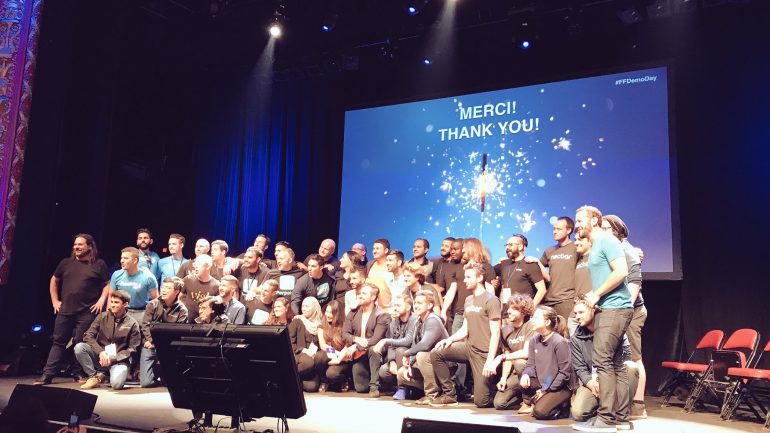On Tuesday evening, a full and buzzing Olympia Theatre in Montreal played host to FounderFuel’s 10th Demo Day. An accelerator program founded out of the Real Ventures fund, FounderFuel provides structured and unstructured mentoring and coaching by proven entrepreneurs over a three-month residency in Montreal’s Notman House. The eight startups included in this latest cohort span industries, taking on some of our world’s biggest problems, and presenting solutions that not only are impressively viable, but have already gained significant traction in many cases.
“I’m proud to say that this year, we’ve hit $100 million in investment in FounderFuel companies,” said Sylvain Carle, partner at Real Ventures and former General Manager of FounderFuel. “Some of these companies grow up, scale, become amazing. Some companies fail amazingly fast. We accelerate everything,” he joked.
Having graduated 87 startups through the FounderFuel accelerator, the companies that are still scaling and growing now have a valuation of $300 million, “a third of a unicorn, or as we say, a narwhal in Canada,” continued Carle.
The quality of pitches was high, with eight “potentially world-class companies” presenting tech solutions. But there were three companies in particular with their sights on saving the world.
"You don't have to be in #SiliconValley to build a startup, whether you are in Colorado, Toronto or #Montreal. " @dbrown at #FFdemoday pic.twitter.com/jJi8sqhwPr
— Xavier.R (@XavRoso95) July 12, 2017
Nectar, an apiary management platform, uses sensors and artificial intelligence to monitor the health of beehives. “Everyone in the audience should care, because almost a third of the food we grow depends on pollination,” said Marc-André Roberge, CEO of Nectar, describing why apiary management is so important. “Nectar will be the company that helps beekeepers increase our bee survival rate and make money doing so. We will ensure efficient pollination services to secure our food bank, and eventually, we might even save the world.”
Brisk Synergies, a company that uses AI to monitor traffic flow, predict accidents, and help cities understand where and how to improve road safety, is already being used in Toronto, Montreal, New York State, and Waterloo, among other cities.
FounderFluel #FFDemoDay pic.twitter.com/fmGM3gaz3U
— CTVM info (@ctvm) July 11, 2017
“Toronto has over 100,000 cameras just downtown… monitored by a small team of traffic engineers, 24/7 with zero data extracted. So what’s the point of these cameras?” asked CEO Charles Chung. “We have created an innovative solution at Brisk Synergies. By leveraging existing infrastructures, we tap into these cameras to continuously monitor traffic flow and to measure road safety.”
The third world-saving startup was Porpoise, a platform that enables companies to measure and share their community impact by tracking volunteerism and producing reports with the collected data.
“When we combine the power of people with the reach of business, we can have an incredible impact,” said Topher Kingsley-Williams, Porpoise CEO.
By creating a platform that enables companies to easily track their employees’ volunteer hours, Porpoise has already increased employee engagement in their target market — companies with 100 to 1,000 employees who are required to report on corporate social responsibility.
Kesho communications au @founderfuel Demo Day 2017 pour assister aux présentations de nos clients #Mims et @BriskSynergies #FFDemoDay pic.twitter.com/JNv4vBhBh5
— Kesho (@keshocom) July 11, 2017
The other startups were more service-oriented, but no less impressive in terms of their potential impact on markets that may have otherwise been untapped.
The startup that stood out for having already disrupted an extremely conservative industry was Lexop, a platform that sends, tracks, and proves document delivery — by email. The first tool of its kind to be approved for use by the Régie du logement, Quebec’s housing authority, the service is ten times less expensive than using a bailiff, and takes a fraction of the time and effort to send. It has been applied to legal and property management at this point, with intention to move into debt collection next.
“What used to take hours, takes seconds now. Imagine how useful that is for a property owner with thousands of units,” said CEO, Amir Tajkarimi.
Lexop has already grown to 300 clients in one year, and sent 5 million pages electronically, “so we’re kind of clean tech also,” Tajkarimi added.
The other four startups include Vish Color, the first hair colour management solution that significantly reduces hair colour waste and increases client retention, saving their clients thousands of dollar in the process; Fleetrio, a smart fleet management tool for companies that tracks service needs, monitors performance, and sends mechanics directly to vehicles that need work; MIMs (My Intelligent Machines) who just launched MIMsOmic, an intelligent platform that helps life scientists in academia, hospitals, and pharma/biotech industries to find, analyze, and interpret large omic datasets without any prior knowledge in bioinformatics and computer programming; and Stay22, a hotel booking service that maps all nearby accommodation options for events and conferences.
“Doing a startup is like sprinting a marathon,” remarked Real Ventures Partner, John Stokes. “You have to go hard and then you have to deliver and then you have to take a breath and go on.”
For the eight startups who presented on Tuesday night, the marathon is not over, but they’re all likely taking a big breath.
Feature photo via Twitter


